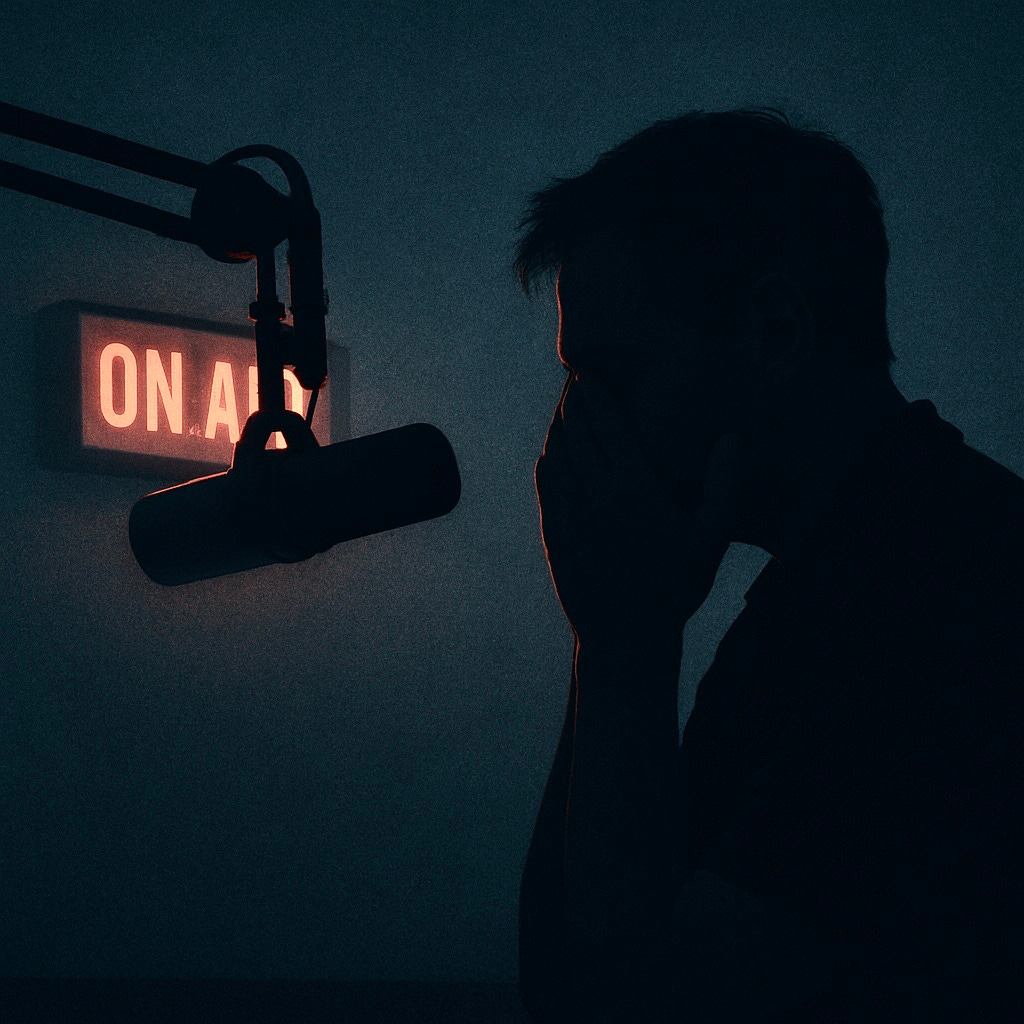Air Pressure
Living With Anxiety in a Career Built on Performance
There’s a kind of joke in radio — you’re always just one bad ratings book away from being unemployed. It’s funny, until it’s not.
I’ve lived most of my life with generalized anxiety disorder. It’s the kind of thing that doesn’t care what you’re doing — it just quietly sets your nervous system on fire and lets you deal with the smoke. You feel like you’re constantly on the brink of catastrophe.
And yet, I chose a profession that’s basically a constant stress test: live performance, unpredictable bosses, shifting formats, corporate takeovers, public scrutiny, mass layoffs. Radio is a job where you never really know when the other shoe’s going to drop — you just know it will.
Radio is a business built on a paradox: you have to sound calm, confident, and authoritative… even if inside you're falling apart. You don't get to show the panic. You don’t get to break down on-air. You keep it together, hit your marks, and make the news sound like you’ve got it all under control — even when you don’t.
Just about everybody who works in the medium can tell you about their anxiety dreams – how they’re almost always radio-based. The music is running out. You can’t find anything else to play. You can’t get to the microphone. You can’t read the script, and you’re about to go live. There’s dead air and you can’t stop it.
The weird thing about those anxiety dreams is how often they’ve happened in real life, in the studio, on the air.
Generalized anxiety isn't just nerves before a show. It's waking up in the middle of the night because you forgot to respond to a text from your boss and now your brain thinks you're about to be fired. It’s pre-writing your own layoff announcement in your head every time there’s a corporate email marked “important.” It’s second-guessing every sentence you say on-air and replaying mistakes in your head for hours. It’s also second-guessing everything you’ve said in the office, wondering if you offended someone in management and you just know that they’re going to call you in for that meeting where they tell you, “We’ve decided to go in a different direction.”
And if your boss yells at you, which happens all the time, you’re sure your head is on the chopping block. And if something went wrong on a Friday, anxiety disorder makes sure you spend the whole weekend nauseous and scared. It makes you crazy. If you don’t have yourself under control, you make embarrassing and panicked phone calls.
Add performance anxiety on top of that, and some days it feels like you’re sprinting through fog. You can’t see the finish line. But you have to keep going. It’s your job. You have no choice because you’re not independently wealthy and you need that paycheck.
And you are always, and I mean always, convinced that you’re not really any good, you’re not that talented, you only have mediocre ability, and soon everyone else will see through what you’re sure is your fakery.
There are coping mechanisms, sure. Breathing exercises. Mantras. You learn what helps and what doesn’t. You build rituals that hold you together just long enough to get through the show. Sometimes it’s enough. Sometimes it isn’t. But you thank all the gods in the sky or the earth that you’ve found a good doctor and the right meds.
I’ve never had an anxiety attack on the air, but I know people who have. No hell burns hotter.
And yet — here’s the weird thing — this job also gives anxiety a kind of shape. Because you have to show up. You have to keep talking. There’s no room to spiral once you’re live. That red “ON AIR” light becomes a lifeline. It demands focus. It doesn’t let you drift.
There have been times in my life, when I was going through some kind of private trauma — a family member dying, an illness you can’t tell anyone about, a divorce — when being on the air, whether as a news anchor or music DJ or programmer scheduling music, was the ONLY thing that slowed my overheated brain enough that I could cope.
In a strange way, radio teaches you how to function through fear. And some days, that feels like a superpower.
There’s no big takeaway here, no neat bow to wrap it up. Just this: if you live with anxiety and you’re doing the work anyway — if you’re showing up, putting yourself out there, holding it together in front of the world — you’re doing something extraordinary.
Even if no one sees it.
But let me add this advice: If you have more than normal anxiety, if you have suffered panic attacks, do everything you can to find a good psychiatrist, and don’t be afraid to do the hard work figuring out what medications can help you. And seek out a good therapist to go with the chemical help.
You have to survive. Because you are good at what you do. You do have talent. You do have ability. And you add something to the world — not just for the faceless people listening to you, but for your friends, your family, and the coworkers who quietly look up to you.


